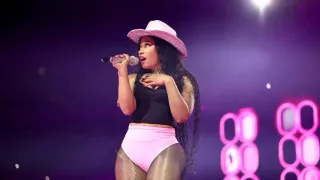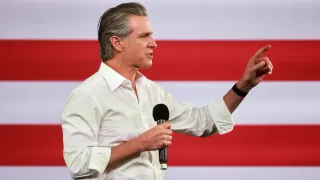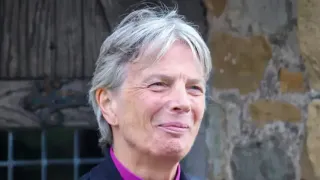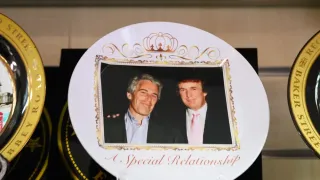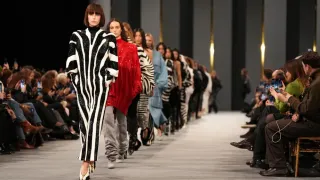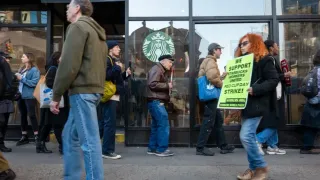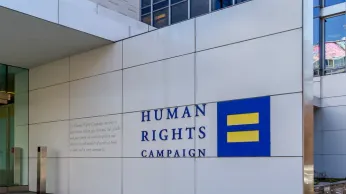
6 hours ago
Human Rights Campaign Ditches Weapons Sponsors After Queer Activist Pressure
READ TIME: 3 MIN.
In the ever-vibrant tapestry of queer activism, there are moments when the chorus of community voices grows too loud to ignore. This February, the Human Rights Campaign—often called the largest LGBTQ+ civil rights organization in the United States—faced just such a reckoning. After weeks of mounting pressure and a fiery protest in Manhattan, HRC has officially dropped sponsorships from weapons manufacturers, including Northrop Grumman, following demands from advocacy groups that the organization sever ties with companies supplying arms to the Israeli military amid the Gaza conflict.
For many LGBTQ+ people, especially those with intersectional identities and global connections, the question of ethical alliances isn’t academic—it’s deeply personal. The protest outside HRC’s Greater New York Dinner in 2024, organized by ACT UP New York, wasn’t just about money or optics. It was a declaration that queer liberation cannot be divorced from the struggles of marginalized people everywhere, including civilians caught in war zones.
The Manhattan protest was a vivid spectacle, with activists and allies waving signs, chanting for Palestinian solidarity, and demanding HRC leadership publicly call for an end to the bombardment of Gaza. The crowd, made up of trans organizers, queer youth, and longtime AIDS activists, embodied the spirit that has always driven LGBTQ+ progress—a willingness to disrupt, to question, and to demand better from those who claim to represent us.
One protestor, quoted in The Advocate’s coverage, captured the mood: “You can’t advocate for queer liberation while taking money from the same corporations that profit off of violence against marginalized people worldwide.” Their words echoed through social media in the days that followed, sparking a wave of online solidarity posts, memes, and pointed calls for institutional accountability.
The HRC’s decision to cut sponsorships from weapons manufacturers is more than a PR maneuver—it’s a test of what it means to be a truly intersectional movement in 2025. For years, LGBTQ+ organizations have been called out for “pinkwashing”—a term activists use when corporations or institutions tout their support for queer rights while engaging in harmful practices elsewhere. The Gaza crisis, with its devastating toll on civilians and growing international scrutiny, has made it impossible for major advocacy groups to ignore the complexities of aligning with arms dealers.
The outcry wasn’t limited to New York. Across the country, LGBTQ+ communities have increasingly mobilized around intersectional justice, linking queer rights with anti-war activism, racial justice, and trans liberation. Social media campaigns, including hashtags like #QueersForPalestine and #NoQueerBloodMoney, trended in the wake of the protest, amplifying demands for HRC and other major organizations to practice what they preach.
While HRC’s announcement was welcomed by many, it came amid a turbulent period for the organization. Earlier this month, HRC revealed sweeping layoffs, cutting approximately 20% of its workforce—including entire teams focused on transgender people and youth, and its internal Diversity, Equity & Inclusion (DEI) leadership. The timing raised eyebrows: Was the decision to drop weapons sponsors a genuine shift—or damage control in response to internal and external crises?
In an official statement shared with The Advocate, an HRC spokesperson said, “We remain committed to aligning our partnerships with our values, and listening to the voices of our community. The decision to end our relationships with weapons manufacturers is a step toward ensuring our work reflects the principles of peace, equity, and justice.”
It’s a promising soundbite—but activists and staffers are watching closely. The layoffs have sparked concern about the sustainability of HRC’s programs for the most vulnerable LGBTQ+ populations. Some insiders have questioned whether sponsorship changes will be matched by renewed commitment to trans and youth advocacy, especially as anti-LGBTQ+ legislation surges nationwide.
The HRC’s sponsorship pivot is a watershed moment for the broader LGBTQ+ movement. It signals that community pressure works—and that queer people will demand more than rainbow logos and empty pledges. In today’s interconnected world, queer justice is global justice. Whether marching for Palestine, fighting anti-trans bills, or organizing mutual aid, LGBTQ+ activists are proving that solidarity can—and must—cross borders.
As one ACT UP organizer put it, “Every dollar spent on weapons is a dollar stolen from our communities’ futures. We won’t stand by while our liberation is used as a smokescreen for violence.”
For LGBTQ+ readers, this story isn’t just about institutional politics—it’s about the power of community. It’s about the way queer people have always shown up for each other, and for anyone facing oppression. As the dust settles, HRC—and every organization claiming to fight for queer rights—faces a choice: Stand with the community, or risk irrelevance.
As new coalitions emerge and intersectional demands grow louder, one thing is clear: Queer activism is as fierce, creative, and uncompromising as ever. The sponsors may change, but the passion for justice remains. From the ballroom to the boardroom, the fight for liberation continues—louder, prouder, and more united than ever.
